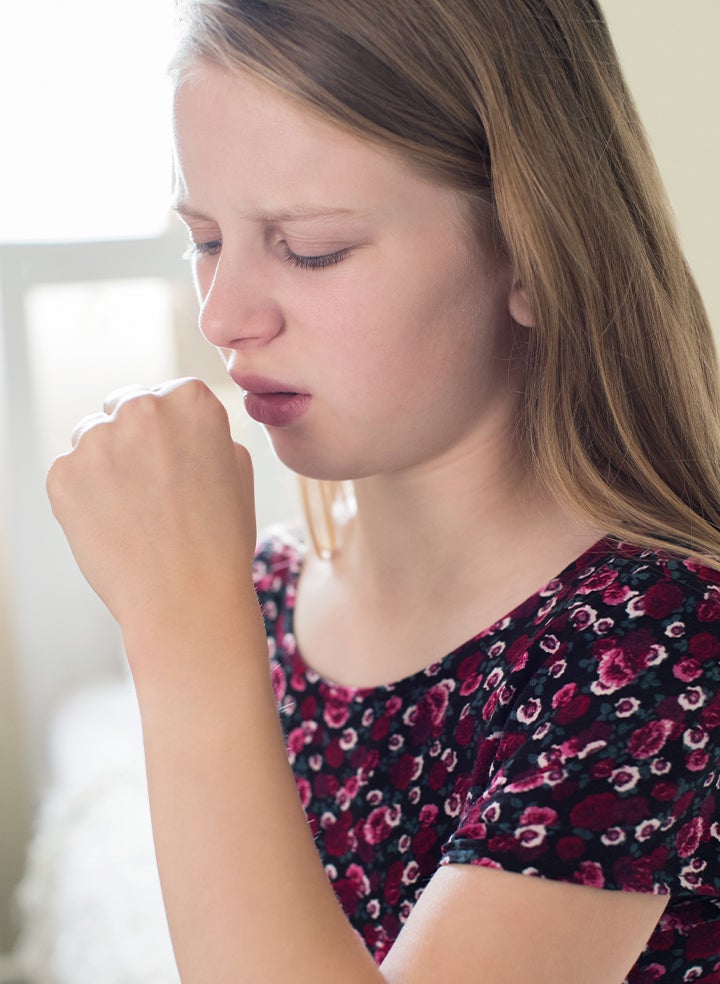What to Know About Whooping Cough (Pertussis)
Pertussis is most dangerous in infants. For infants, the cough can be minimal or not even present. Here’s what to know.

Pertussis, or whooping cough, is a highly contagious respiratory disease caused by the bacteria Bordetella pertussis. It is characterized by a severe cough followed by a high-pitched intake of breath that sounds like a “whoop.” Pertussis spreads easily between individuals through droplets caused by coughing or sneezing but can be prevented by immunization.
Symptoms
Once infected with pertussis, symptoms appear 7-10 days after infection and are usually mild and resemble symptoms of the common cold. These early symptoms include:
Low-grade fever
Runny nose
Cough
Red, watery eyes
Nasal congestion
After about a week or two, symptoms worsen as thick mucus accumulates in the airways, resulting in severe coughing. These coughing attacks may cause:
Vomiting
Red or blue in the face
Extreme fatigue
A high-pitched “whoop” sound when taking a breath of air
Whooping Cough Treatment
Early treatment of pertussis is very important as it may make your infection less serious. Treatment generally involves antibiotics and can also help prevent the disease from spreading. Unfortunately, after about three weeks of the illness, treatment is unlikely to help because the bacteria is gone from your body, even though it is likely that symptoms will remain.
In order to manage pertussis and reduce the likelihood of spreading it to others, you should:
Follow the directions for the use of antibiotics
Keep your home free of irritants that can trigger coughing, including smoke, dust and chemical fumes
Practice good hygiene
Use a clean, mist vaporizer or humidifier to help loosen mucus and soothe a cough
Drink plenty of fluids to prevent dehydration
Eat small meals every few hours to help prevent vomiting
Prevention
“The best way to prevent pertussis is to get vaccinated,” says Dr. Buzzard. “For children, the vaccine is called DTaP, and the booster vaccine for preteens, teens and adults is called Tdap. This vaccine protects against a combination of three diseases: diphtheria, tetanus and pertussis. However, you should note that if pertussis is circulating in your community, there’s occasionally a chance that even someone who has been vaccinated can still catch the disease.”
Like many illnesses, pertussis is spread by coughing or sneezing while nearby other people, who then breathe in the bacteria. Practicing good hygiene is an effective way to prevent the spread of pertussis. Practicing good hygiene involves:
Covering your mouth and nose with a tissue when you cough or sneeze
Disposing of your used tissues in the trash
Coughing or sneezing into your upper arm or elbow, not your hands, if a tissue isn’t available
Frequently washing your hands with soap and water
Using an alcohol-based hand sanitizer if soap and water are not available
Sources:
Centers for Disease Control and Prevention, “Pertussis (Whooping Cough),” https://www.cdc.gov/pertussis/
World Health Organization, “Pertussis,” https://www.who.int/immunization/diseases/pertussis/en/
Mayo Clinic, “Whooping Cough,” https://www.mayoclinic.org/diseases-conditions/whooping-cough/basics/definition/con-20023295
WellNow Urgent Care is a series of urgent care clinics and virtual care serving the Midwest and Northeastern United States in Illinois, Indiana, Michigan, New York, Pennsylvania and Wisconsin.
Information contained in this blog is for informational or educational purposes only and does not substitute professional medical advice or consultations with healthcare professionals. The content is not meant to be complete or exhaustive or to apply to any specific individual's medical condition. Always refer to the personalized information given to you by your doctor or contact us directly.
